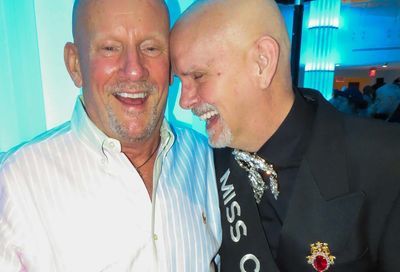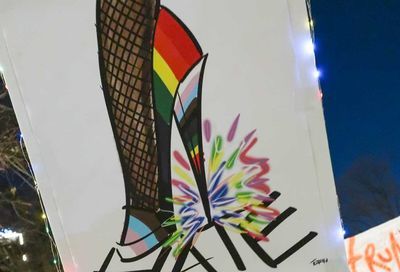“Am I Gay?” Google Searches Are Higher in Red States
Google searches related to LGBTQ identity have risen 1,300 percent over the past 19 years, according to one analysis.

An analysis of Google trends reveals that searches related to personal sexual orientation and gender identity have skyrocketed over the past 19 years.
According to the analysis, conducted by the Cultural Currents Institute, Google searches for questions such as “Am I gay?” “Am I lesbian?” “Am I trans?” and “how to come out,” as well as searches for “nonbinary” have jumped by 1,300 percent since 2004.
The analysis suggests that more politically conservative states are the “most closeted,” with Utah, Iowa, Indiana, West Virginia, and New Hampshire leading the list of top states where Google users have searched “Am I gay?”
For “Am I lesbian?” the top states were: Utah, Connecticut, Kentucky, Washington, and Colorado.
For “Am I trans?” the top states were: Utah, Kentucky, Colorado, Michigan, and Washington.
For the term “how to come out,” the states with the most searches were: Oklahoma, West Virginia, Mississippi, Louisiana, and Kentucky.
“The regional differences highlighted below are significant, offering a geographical landscape of self-questioning and discovery across America,” Cultural Currents’ analysis reads.
“Utah, a state with traditionally conservative social values, surprisingly tops three out of five search term categories. This might indicate a significant underlying questioning of identity among its internet users, possibly driven by the conflict between personal feelings and societal expectations.”
Cultural Currents also notes that “tensions between public life and web searches” appear to be common in Utah, noting that searches for “VPN,” or “virtual private network” — a way to establish a secure connection that can encrypt online traffic and hide a user’s IP address — increased in the state after the website PornHub blocked the state, in protest of a state law requiring users to verify their age by entering a unique digital ID tracking every visit they make to adult websites.
But the higher number of searches in so-called “red” states may also be indicative of the lack of on-the-ground resources or community centers where questioning individuals can learn more about the LGBTQ community or seek guidance.
Particularly with recent bouts of legislation seeking to bar teachers and guidance counselors from addressing LGBTQ identity-related issues with students, people, especially youth, may be resorting to Internet searches to find information that is otherwise closed off to them.
By comparison, the analysis found Google searches for the term “nonbinary” were highest in Vermont, followed by Oregon, Maine, Montana, and Washington — showing higher awareness of the term, which has only recently become part of mainstream dialogue, in Democratic-leaning states.
However, it should be noted that the data for all these LGBTQ-related searches is relative, representing each term’s share of all Google searches over a specific time period.
That means that the data will not reflect that a higher number of individuals overall — which would result in an increase in searches as a wider pool of people brings about more intellectual and ideological diversity — are using Google today than in 2004.
The analysis comes at a time when conservative politicians have embraced anti-LGBTQ legislation as a winning issue, believing that exploiting “culture war” issues resonates more deeply with voters and can lead them to electoral success.
Nearly 500 bills targeting LGBTQ rights have been introduced this year in 45 states, according to the American Civil Liberties Union.
Fifty-seven of those bills have since become law, including bans on gender-affirming care for trans youth, restrictions on restroom facilities for transgender people, prohibitions on LGBTQ content in schools, and bans of books featuring LGBTQ themes or characters.
Support Metro Weekly’s Journalism
These are challenging times for news organizations. And yet it’s crucial we stay active and provide vital resources and information to both our local readers and the world. So won’t you please take a moment and consider supporting Metro Weekly with a membership? For as little as $5 a month, you can help ensure Metro Weekly magazine and MetroWeekly.com remain free, viable resources as we provide the best, most diverse, culturally-resonant LGBTQ coverage in both the D.C. region and around the world. Memberships come with exclusive perks and discounts, your own personal digital delivery of each week’s magazine (and an archive), access to our Member's Lounge when it launches this fall, and exclusive members-only items like Metro Weekly Membership Mugs and Tote Bags! Check out all our membership levels here and please join us today!























You must be logged in to post a comment.